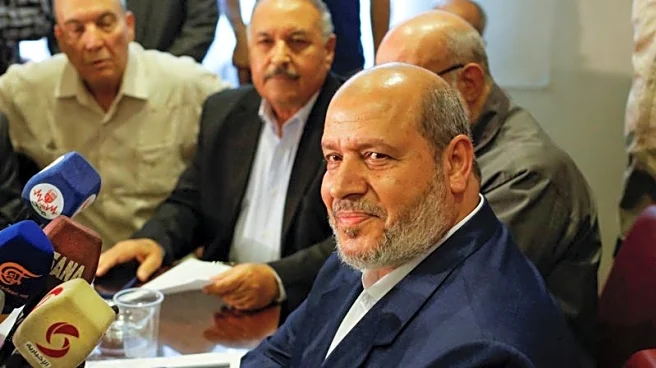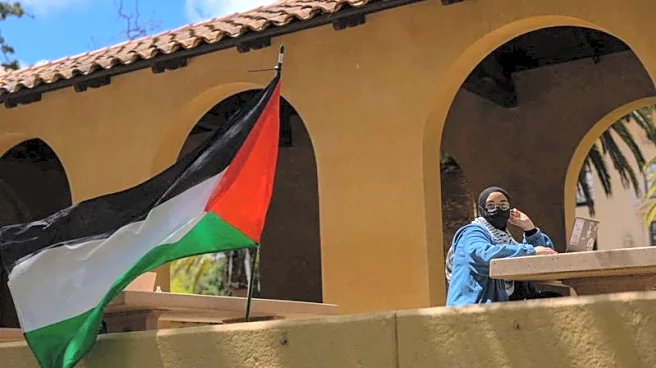By Nidal al-Mughrabi
(Reuters) -Khalil Al-Hayya, the senior Hamas official who survived an Israeli raid on Qatar last month, was heading back to indirect talks with Israeli counterparts on Monday over President Donald Trump's plan to end the Gaza War.
Hayya, who lost a son in the current Gaza war and two sons in previous conflicts, has been based with other Hamas leaders in Doha.
He has become increasingly influential in the militant group as other top Hamas officials have been killed in Israeli strikes,
among them Ismail Haniyeh on a visit to Iran and Yahya Sinwar in the Gaza Strip.
On Monday, he was in Sharm el-Sheikh for indirect talks with Israel on Trump's 20-point plan that will include exchanging Israeli hostages in Gaza for Palestinian prisoners held in Israeli jails.
Hayya has been at the heart of ceasefire talks throughout the Gaza war that erupted when Hamas launched a surprise attack on Israel on October 7, 2023, prompting a sweeping Israeli offensive that has flattened much of the enclave since then.
HAYYA NOW SEEN AS GROUP'S MOST INFLUENTIAL FIGURE ABROAD
An earlier ceasefire initiative had been on the agenda for discussion between the 64-year-old and other Hamas leaders when they were targeted in Israel's September 9 attack on Doha, in which six people were killed but no top Hamas officials.
Hayya, widely seen as the group's most influential figure abroad since Haniyeh was killed by Israel in Iran in July 2024, is part of a five-man leadership council based in Qatar that has led Hamas since Yahya Sinwar, the mastermind of the October 2023 attacks, was killed last year.
Hailing from the Gaza Strip, Hayya is a veteran member of the Islamist group. Regarded as having good ties with Iran, a vital source of arms and finance for Hamas, he has been closely involved in the group's efforts to broker several truces with Israel, playing a key role in ending a 2014 conflict and again in attempts to secure an end to the current Gaza war.
Hayya has been part of Hamas since it was set up in 1987. In the early 1980s, he joined the Muslim Brotherhood, the Sunni Islamist movement from which Hamas emerged, along with Haniyeh and Sinwar, Hamas sources say.
In Gaza, he was detained several times by Israel.
In 2007, an Israeli airstrike hit his family home in Gaza City's Shejaia quarter, killing several relatives. In 2008, his son Hamza was killed by an Israeli airstrike.
In the 2014 war between Hamas and Israel, the house of Hayya's eldest son Osama was bombed, killing him, his wife and three of their children.
TIES WITH IRAN, TALKS WITH SYRIA
Hayya left Gaza several years ago, serving as a Hamas point person for ties with the Arab and Islamic worlds and basing himself in Qatar. He accompanied Haniyeh to Tehran for the visit in July during which he was assassinated.
He has been cited as saying the October 7 attacks had been meant as a limited operation by Hamas to capture "a number of soldiers" to swap for jailed Palestinians.
"But the Zionist army unit completely collapsed," he said in comments published by the Hamas-linked Palestinian Information Center, referring to Israel's military.
He has said the attack succeeded in bringing the Palestinian issue back into international focus.
Hamas-led militants killed some 1,200 people and abducted 251 others in the attacks, according to Israeli tolls. More than 67,000 Palestinians have been killed in Israel's offensive in Gaza since then, according to the Gaza health ministry.
Alongside leading Hamas delegations in mediated talks to try to secure a ceasefire, he has performed a range of other high-profile political work for the group.
In 2022, he led a Hamas team to Damascus to mend ties with former Syrian President Bashar al-Assad, broken a decade earlier when the movement endorsed the largely Sunni uprising against Assad, a member of the minority Alawite sect.
The breach had strained a regional alliance built by Iran to counter Israel and the United States.
(Writing by Tom Perry; Editing by Edmund Blair and Janet Lawrence)















